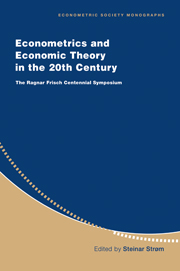Book contents
- Frontmatter
- PART I RAGNAR FRISCH AND HIS CONTRIBUTIONS TO ECONOMICS
- PART II UTILITY MEASUREMENT
- 4 Nonparametric Estimation of Exact Consumer Surplus and Deadweight Loss
- 5 Consumer Demand and Intertemporal Allocations: Engel, Slutsky, and Frisch
- PART III PRODUCTION THEORY
- PART IV MICROECONOMIC POLICY
- PART V ECONOMETRIC METHODS
- PART VI MACRODYNAMICS
- PART VII MACROECONOMIC PLANNING
- Author Index
- Subject Index
4 - Nonparametric Estimation of Exact Consumer Surplus and Deadweight Loss
from PART II - UTILITY MEASUREMENT
Published online by Cambridge University Press: 05 January 2013
- Frontmatter
- PART I RAGNAR FRISCH AND HIS CONTRIBUTIONS TO ECONOMICS
- PART II UTILITY MEASUREMENT
- 4 Nonparametric Estimation of Exact Consumer Surplus and Deadweight Loss
- 5 Consumer Demand and Intertemporal Allocations: Engel, Slutsky, and Frisch
- PART III PRODUCTION THEORY
- PART IV MICROECONOMIC POLICY
- PART V ECONOMETRIC METHODS
- PART VI MACRODYNAMICS
- PART VII MACROECONOMIC PLANNING
- Author Index
- Subject Index
Summary
Introduction
Nonparametric estimation of regression models has gained wide attention in econometrics in the past few years. Nonparametric models are characterized by very large numbers of parameters. Often they may be difficult to interpret, and their usefulness in applied research has been demonstrated in a limited number of cases. We apply nonparametric regression models to estimation of demand curves of the type most often used in applied research. After estimation of the demand curves, we then derive estimates of exact consumer surplus and deadweight loss, which are the most widely used welfare and economic-efficiency measures in areas of economics such as public finance. We also work out asymptotic normal sampling theory for the nonparametric case, as well as the parametric case (where, except in certain analytic cases, the results are not known).
This study includes an application to gasoline demand. Empirical questions of interest here are the shape of the demand curve and the average magnitude of welfare loss from a tax on gasoline. In this application we compare parametric and nonparametric estimates of the demand curve, calculate exact measures of consumer surplus and deadweight loss, and give estimates of standard errors. We also analyze the sensitivity of the welfare measures to components of nonparametric regression estimators such as window width and number of terms in a series approximation.
- Type
- Chapter
- Information
- Econometrics and Economic Theory in the 20th CenturyThe Ragnar Frisch Centennial Symposium, pp. 111 - 146Publisher: Cambridge University PressPrint publication year: 1999



